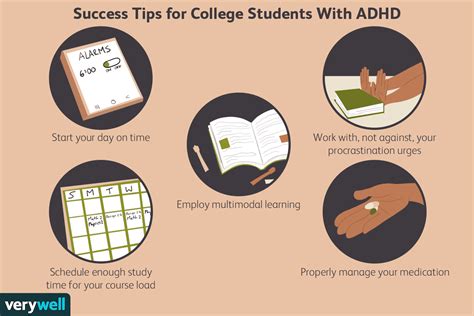Graduate school presents unique challenges for students with Attention Deficit Hyperactivity Disorder (ADHD). The demands of rigorous academic work, coupled with the need for self-directed learning and time management, can amplify the difficulties commonly experienced by individuals with ADHD. However, with appropriate strategies and support, students with ADHD can thrive in graduate school.

Understanding ADHD in Grad School
ADHD is a neurodevelopmental condition that affects attention, impulsivity, and hyperactivity. It can manifest differently in adults than in children, often presenting as difficulty sustaining attention, staying organized, and managing time effectively.
Pain Points for Grad Students with ADHD
Students with ADHD in graduate school may encounter several obstacles:
- Difficulty concentrating on complex academic material
- Procrastination and disorganization
- Impulsivity and difficulty controlling impulses
- Difficulty managing multiple tasks and meeting deadlines
- Social challenges and isolation
Motivations for Grad Students with ADHD
Despite these challenges, students with ADHD are often highly motivated to succeed in graduate school. They may possess strong intellectual curiosity, creativity, and a desire to make a difference in the world.
Strategies for Success
Navigating graduate school with ADHD requires a multifaceted approach. Students can implement the following strategies to enhance their success:
1. Academic Strategies
- Break down assignments: Divide large tasks into smaller, more manageable chunks.
- Prioritize tasks: Use a to-do list or planner to organize assignments and allocate time effectively.
- Take breaks: Step away from studies regularly to prevent burnout and improve focus.
- Use assistive technology: Utilize apps and tools that support organization, time management, and note-taking.
2. Time Management Strategies
- Establish a routine: Stick to a regular schedule for studying, sleeping, and breaks.
- Block out time: Dedicate specific time slots for academic work and stick to them.
- Delegate tasks: Ask for help from classmates, friends, or family members to manage non-essential tasks.
3. Organization Strategies
- Create a designated workspace: Establish a quiet and organized area for studying.
- Use color-coding and labels: Color-code folders, notes, and textbooks to enhance visual organization.
- Keep a digital calendar: Schedule appointments, assignments, and other commitments electronically.
4. Impulsivity Management Strategies
- Identify triggers: Recognize situations that trigger impulsive behaviors and develop coping mechanisms.
- Practice mindfulness: Take moments to pause and reflect before reacting impulsively.
- Use fidget toys: Engage with fidget toys during lectures or meetings to channel excess energy.
5. Social Support Strategies
- Join support groups: Connect with other students with ADHD to share experiences and support each other.
- Build relationships with professors: Establish open communication with professors and discuss challenges related to ADHD.
- Seek counseling: Consider working with a therapist or counselor who specializes in ADHD to develop coping mechanisms and enhance emotional well-being.
Pros and Cons of ADHD in Grad School
While ADHD presents challenges, it can also offer certain advantages for graduate students:
Pros:
- Hyperfocus: Individuals with ADHD can experience periods of intense focus and engagement when interested in a topic.
- Creativity: ADHD is often associated with heightened creativity and innovative thinking.
- Resilience: Students with ADHD often develop strong coping skills and resilience in overcoming obstacles.
Cons:
- Difficulty concentrating: Sustained attention can be challenging for individuals with ADHD, especially with complex or uninteresting material.
- Procrastination: ADHD can lead to difficulty initiating and completing tasks, resulting in procrastination.
- Impulsivity: Impulsive behaviors can interfere with academic progress and social interactions.
Tips and Tricks
- Find a study buddy: Collaborating with a classmate can provide accountability and support.
- Use timers: Set timers for study sessions and breaks to improve time management.
- Reward yourself: Set small rewards for completing tasks to motivate yourself.
- Take advantage of accommodations: Grad students with ADHD may be eligible for accommodations such as extended time on assignments or reduced class distractions.
Useful Tables
Table 1: ADHD Symptoms in Adults
| Symptom | Description |
|---|---|
| Inattention | Difficulty paying attention, following instructions, and staying organized |
| Hyperactivity | Fidgeting, restlessness, and difficulty sitting still |
| Impulsivity | Difficulty controlling impulses, acting without thinking, and interrupting others |
Table 2: Pros and Cons of ADHD in Grad School
| Pro | Con |
|---|---|
| Hyperfocus | Difficulty concentrating |
| Creativity | Procrastination |
| Resilience | Impulsivity |
Table 3: Strategies for Academic Success in Grad School
| Strategy | Description |
|---|---|
| Break down assignments | Divide large tasks into smaller, more manageable chunks. |
| Prioritize tasks | Use a to-do list or planner to organize assignments and allocate time effectively. |
| Take breaks | Step away from studies regularly to prevent burnout and improve focus. |
| Use assistive technology | Utilize apps and tools that support organization, time management, and note-taking. |
Table 4: Time Management Strategies for Grad School
| Strategy | Description |
|---|---|
| Establish a routine | Stick to a regular schedule for studying, sleeping, and breaks. |
| Block out time | Dedicate specific time slots for academic work and stick to them. |
| Delegate tasks | Ask for help from classmates, friends, or family members to manage non-essential tasks. |
Conclusion
ADHD can present challenges for graduate students, but with appropriate strategies and support, it can also be a source of strength. By understanding their unique needs and implementing effective coping mechanisms, students with ADHD can achieve academic success and pursue fulfilling careers. It is essential for universities to provide accessible accommodations and create an inclusive environment that supports students with ADHD.
